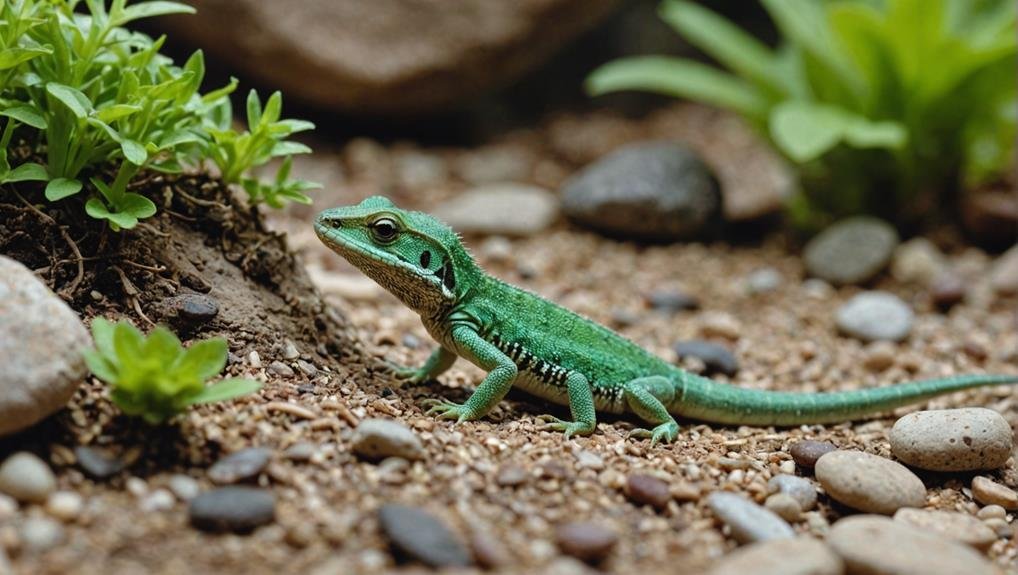When you’re caring for baby lizards, their diet varies greatly depending on whether they’re insectivores, herbivores, or carnivores. You might be curious about the specific foods that meet their nutritional needs. For example, insectivores thrive on small insects like crickets and mealworms, while herbivores need a mix of fruits and vegetables. Carnivorous baby lizards, on the other hand, rely on small prey. Knowing what’s safe and nutritious is essential for their growth and health—Have you ever wondered how to balance their diet effectively?
Key Takeaways
- Baby lizards primarily eat small insects like crickets, mealworms, and fruit flies.
- Herbivorous baby lizards consume fruits and vegetables such as papaya, kale, and collard greens.
- Calcium and vitamin D3 supplementation is important for bone health in baby lizards.
- Different species have unique dietary needs, so consult a vet for specific diet recommendations.
- A diverse diet of appropriately sized insects prevents choking hazards and meets nutritional needs.
Nutritional Needs
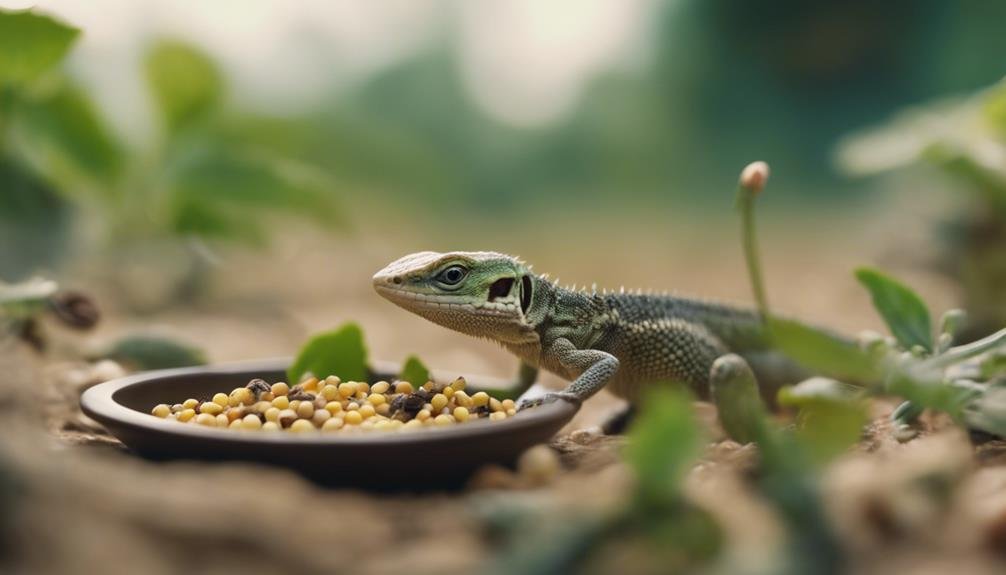

Baby lizards need a balanced diet to support their rapid growth and overall health. Their nutritional needs are quite specific, so it’s essential to guarantee they receive proper nutrition.
A balanced diet of insects forms the foundation of their dietary requirements. Protein is vital for growth and tissue repair, so offering a variety of protein-rich insects like crickets and mealworms is a good start.
Calcium is another critical component for baby lizards, as it helps develop strong bones. To aid in calcium absorption, phosphorus levels should be kept low. Dusting insects with calcium powder before feeding them to your lizard can effectively maintain this balance.
Additionally, vitamin D3 is necessary for calcium metabolism; without it, your baby lizard could develop serious health issues.
Vitamins A and K are also essential for overall well-being. A deficiency in these vitamins can lead to problems like poor vision and blood clotting issues. You might consider using a vitamin spray to prevent these deficiencies.
Wild Baby Lizard Diet
In the wild, young lizards quickly adapt to hunting and foraging, consuming a diet that varies based on their regional habitat. The wild baby lizard diet is important, largely influenced by the specific lizard species and their immediate environment.
Shortly after hatching, baby lizards have the digestive capacity of adults and start hunting small prey like insects. As they grow, they progress to larger prey, adjusting their diet to their increasing size and capabilities.
Different lizard species have unique dietary preferences based on what’s available in their native habitats. For example, a desert-dwelling lizard might consume insects and small plants, while a rainforest lizard could have a diet rich in insects, fruits, and other plant matter. This variety helps them get the necessary nutritional value to grow and thrive.
Understanding the wild baby lizard diet is essential for appreciating how these reptiles survive and adapt to their environments. Their ability to adjust their diet as they grow highlights their adaptability and resilience.
Pet Baby Lizard Diet
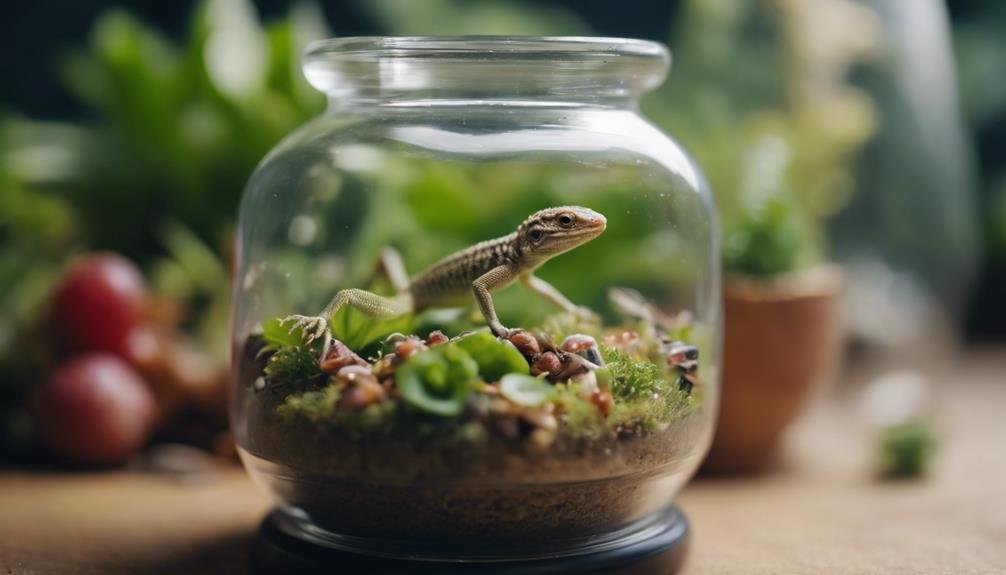

When caring for a pet baby lizard, you must tailor its diet to match its specific species requirements. Baby lizards eat various foods, and the pet baby lizard’s diet should be species-specific to ensure they get the right nutrients.
Pet stores offer live crickets, flies, roaches, and worms for insectivorous baby lizards. To prevent health issues, it’s important to monitor live feeding sessions and promptly remove uneaten prey. On the other hand, herbivorous baby lizards require a mix of fruits, greens, and other plant-based foods to avoid nutritional deficiencies.
Consulting a vet is essential to recommend the appropriate adult food for your baby lizard’s future needs. Since baby lizards’ dietary needs vary widely, adjust their diet based on their species-specific needs and preferences.
Here’s a quick guide to help you understand what different types of baby lizards eat:
| Type of Baby Lizard | Recommended Food |
|---|---|
| Insectivorous Baby Lizards | Crickets, flies, roaches, worms |
| Herbivorous Baby Lizards | Fruits, greens, vegetables |
| Omnivorous Baby Lizards | A mix of insects and plant-based food |
| Carnivorous Baby Lizards | Small rodents, insects |
Insectivore Baby Lizards
Insectivore baby lizards’ diet primarily consists of small insects like crickets, mealworms, waxworms, and fruit flies. These insects provide essential fats, proteins, and minerals for the baby lizard’s growth and development. By offering a variety of small insects, you guarantee a balanced diet that meets all the nutritional content requirements necessary for their health.
Feeding baby lizards with a diverse range of insects keeps their diet interesting and covers different nutritional needs they might have. Crickets are rich in protein, while mealworms and waxworms provide fats. Fruit flies are great for a quick snack, offering additional vitamins and minerals. In the wild, insectivore baby lizards might also consume small spiders, ants, and other tiny invertebrates, broadening their diet further.
It’s important to provide insects of appropriate size to avoid choking hazards. Baby lizards have tiny throats, and large prey can be dangerous. Ensuring the insects are small enough to handle will make feeding time safe and stress-free.
Herbivore Baby Lizards
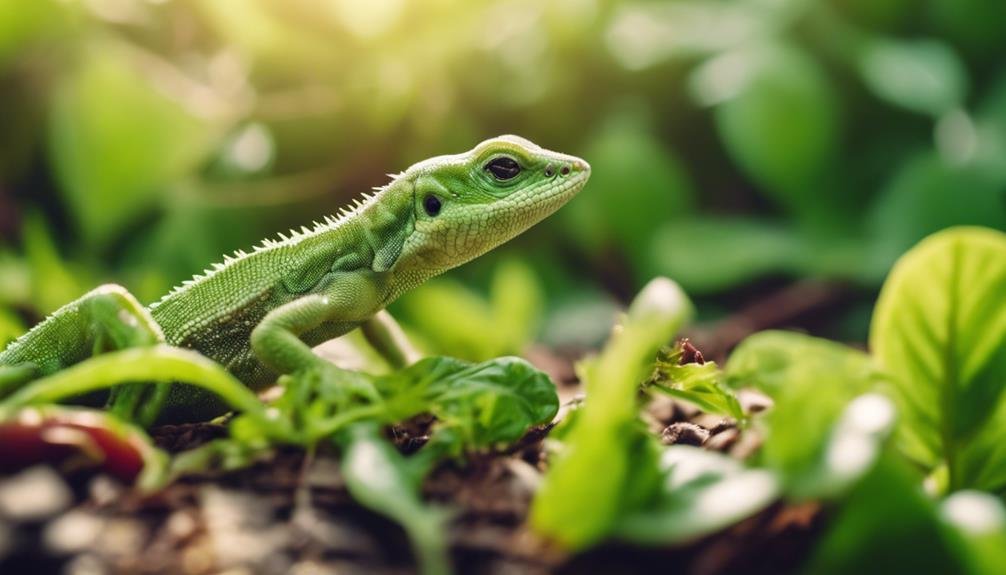

Herbivore baby lizards thrive on a diet rich in fruits like papaya, mango, and banana, which provide essential nutrients for their growth. These fruits aren’t only delicious and packed with vitamins vital for their development. However, it’s important to balance their diet with various fruits and vegetables to ensure they receive all the nutrients they need.
Incorporating veggies such as lettuce, kale, and squash can greatly benefit herbivore baby lizards. Fresh yellow squash is particularly suitable, offering a good mix of vitamins and minerals. Collard greens are another excellent choice due to their high protein content, aiding muscle development and overall growth. Turnip greens can serve as a primary food item, providing a rich calcium and vitamin D source, essential for bone health.
When feeding herbivore baby lizards, chop the fruits and vegetables into manageable pieces to prevent choking. Occasionally, they dust their food with a calcium supplement to ensure sufficient calcium and vitamin D.
This balanced diet will keep your herbivore baby lizards healthy and thriving.
Carnivore Baby Lizards
When caring for carnivore baby lizards, you must provide an insect-based diet rich in fats, proteins, and minerals.
These lizards use hunting techniques to capture crickets, mealworms, and other small prey.
Providing a variety of insects guarantees they get a well-rounded diet essential for their growth.
Insect-based Diet
Baby lizards with a carnivorous diet thrive on insects like small crickets, mealworms, waxworms, and baby dubia roaches. These insects are rich in essential fats, proteins, and minerals, which are important for the growth and development of your baby lizards.
You should dust their food with supplements to ensure they get enough calcium and vitamin D3. This helps prevent metabolic bone disease, a common issue in lizards that lack these nutrients.
When feeding baby lizards, offering appropriately sized insects is essential to avoid choking hazards. The general rule is to provide prey no larger than the space between their eyes.
Due to their smaller size and higher metabolism, baby lizards must eat more frequently, typically daily or every other day. Monitoring their feeding sessions is significant. It would be best to observe how much they eat and promptly remove uneaten prey. This prevents potential health issues and keeps their environment clean.
Hunting Techniques
Young carnivore lizards quickly develop their hunting skills, relying on their instincts and agility to catch live prey. From the moment they hatch, these baby lizards have sharp teeth and strong jaws, enabling them to tear into their meals. Their diet often includes insects, small rodents, and other animals they can overpower.
As a caregiver or observer, you’ll notice that hunting techniques among carnivore baby lizards vary greatly. Some species prefer ambush tactics, patiently waiting for unsuspecting prey to come close before striking with lightning speed. Others are more active hunters, chasing their targets with remarkable swiftness and precision.
These young predators depend heavily on their quick reflexes and keen senses to locate and capture live prey. Their environment plays an important role in shaping their hunting strategies. For example, a lizard living in a dense forest might rely more on stealth, while one in an open desert could depend on speed and endurance.
Understanding the hunting techniques of carnivore baby lizards gives you a deeper insight into their behavior and needs. Providing the right type of live prey and environment can help these fascinating creatures thrive and develop their natural hunting instincts.
Omnivore Baby Lizards
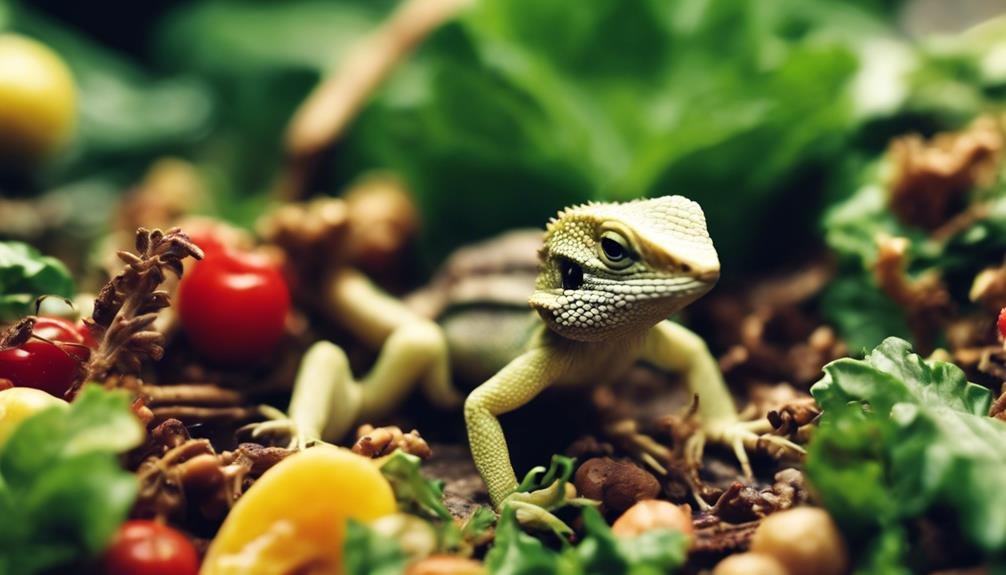

Omnivore baby lizards thrive on a balanced diet that combines insects, fruits, and vegetables. To ensure your omnivorous lizards get the nutrition they need, you’ll want to offer a mix of small insects like crickets, mealworms, and waxworms. These insects provide essential proteins that are important for their growth and development.
But don’t forget the fruits and vegetables. Papaya, mango, and bananas can add necessary vitamins and minerals to their diet. Vegetables such as lettuce, kale, and squash also play an essential role, offering fiber and additional nutrients. Providing a variety of these foods ensures that your baby lizards receive a balanced diet, promoting their overall health.
It’s important to tailor the diet to the specific needs of your lizard species. Consult a vet or thoroughly research to ensure you’re offering the right foods. This approach helps prevent nutritional deficiencies and supports the best development of your baby lizards.
Safe Insects
When selecting safe insects for your baby lizards, keep in mind small crickets, baby dubia roaches, fruit flies, and pinhead crickets. These insects are vital components of a baby lizard’s diet, providing essential fats, proteins, and minerals for their growth and development. To guarantee your baby lizards receive a balanced and nutritional diet, avoid feeding them mealworms due to their hard exoskeletons, which can be challenging for young lizards to digest.
In addition to being important, the size of the insects you offer is key. Baby lizards should be fed smaller insects to prevent choking hazards and to ensure they can easily digest their food. Providing a variety of safe insects helps offer a well-rounded diet that contributes to their overall health.
Here are some significant points to bear in mind:
- Small Crickets: High in protein and easy to digest.
- Baby Dubia Roaches: Nutrient-dense and rich in fats.
- Fruit Flies: Great for tiny lizards, offering variety and easy consumption.
- Pinhead Crickets: Perfect size for young lizards to handle safely.
- Avoid Mealworms: Their tough exoskeleton can cause digestive issues.
Safe Plant Matter
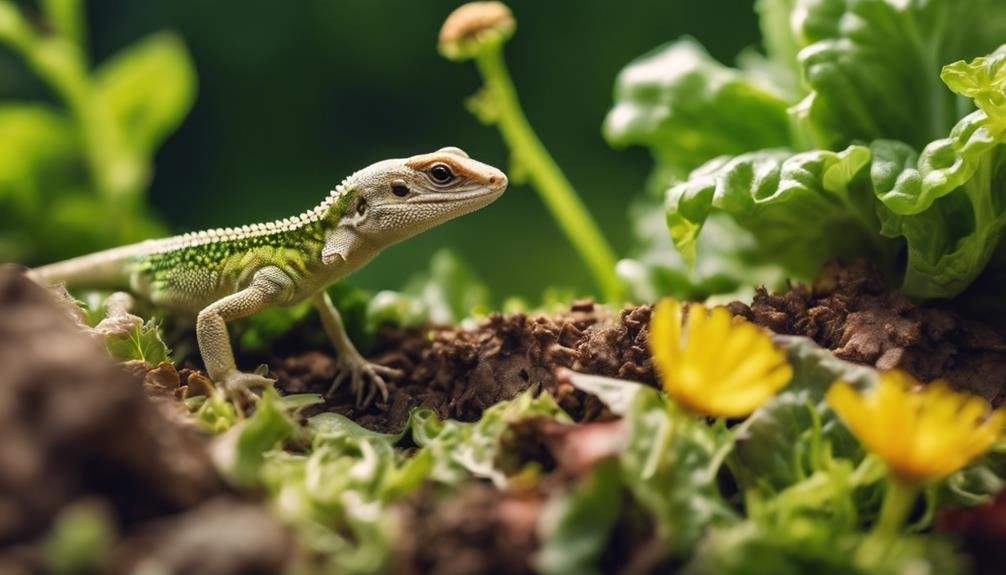

In addition to insects, baby lizards benefit from a diet that includes safe plant matter like dark leafy greens, fruits, and vegetables. Baby lizards need these plant-based foods to get essential vitamins and minerals that support their growth and health.
Leafy kale, collard, and mustard greens are excellent choices. These greens provide a significant source of important nutrients that baby lizards need to thrive.
Fruits can also play a key role in a baby lizard’s diet. Apples, bananas, berries, and melons offer natural sugars and additional nutrients. However, chop the fruits into small, manageable pieces to prevent choking.
Other great options are vegetables like squash, carrots, and bell peppers. These vegetables add variety and fiber to the diet, promoting a healthy digestive system.
Offering a balanced mix of safe plant matter is essential. It ensures that baby lizards receive a well-rounded diet, aiding their overall development.
Feeding Tips
When feeding baby lizards, choose appropriate food that meets their nutritional needs and is easy for them to eat. Stick to meal frequency guidelines, starting with multiple daily feedings and gradually reducing as they grow.
Don’t forget to include necessary nutritional supplements to promote healthy development.
Choosing Appropriate Food
Selecting the appropriate food for your baby lizard guarantees that it receives the necessary nutrients for healthy growth and development. It’s essential to choose food that aligns with its size and nutritional needs.
Start with small insects like crickets, flies, roaches, and worms, perfect for a baby lizard. Always monitor live feeding sessions to ensure your lizard consumes the prey promptly, as uneaten insects can stress or harm them.
Consult a vet to get diet recommendations tailored to your specific baby lizard. They can guide the types of insects and the correct portion sizes, ensuring you meet your lizard’s needs. Additionally, pet stores offer a variety of live prey and dry food options that can be suitable for your baby lizard.
To summarize:
- Small insects: Crickets, flies, roaches, and worms are ideal.
- Monitor feeding: Make certain the baby lizard eats the prey promptly.
- Vet consultation: Get professional dietary advice.
- Pet store options: Utilize available live prey and dry food.
- Adjustments: Change feeding frequency and prey size as your lizard grows.
Choosing the right food is an important step in caring for your baby lizard. It sets the foundation for its healthy development.
Meal Frequency Guidelines
Feeding your baby lizard multiple times a day guarantees they receive the nutrients needed for rapid growth. Initially, it would be best if you aimed to feed your hatchling about five times daily. This important meal frequency ensures your lizard gets enough energy and nutrients to support its fast-paced development.
As your lizard grows, you can gradually reduce the feeding frequency. Around the juvenile stage, you might feed them once a day. Adult lizards must eat only three times a week, depending on their species and dietary needs.
Keep a close eye on your lizard’s appetite and weight. Based on these observations, adjust meal frequency and portion sizes. Remove any uneaten food after 15 minutes to avoid overfeeding and keep the enclosure clean. This practice helps you better monitor your lizard’s eating habits and overall health.
Always cut food into safe sizes to prevent choking hazards, especially for smaller lizards. A balanced diet of insects, fruits, and vegetables is important at different growth stages.
Nutritional Supplements Needed
Ensuring your baby lizard gets the proper nutritional supplements is essential for their growth and health. Providing the right balance of nutrients will support their bone development and overall well-being and prevent deficiencies.
Use calcium powder three times a week to give your baby lizard the best start. This supplement is pivotal for their bone structure.
Additionally, vitamin D3 powder should be included weekly, as it aids in calcium absorption and contributes to their general health. Regularly incorporating these nutritional supplements into their diet will help maintain their growth and keep them thriving.
Always follow the package directions for proper dosages. Over-supplementing can be just as harmful as under-supplementing, so precision is key.
Here are some essential tips to remember:
- Calcium Powder: Sprinkle this on their food thrice weekly to support bone health.
- Vitamin D3 Powder: Use weekly to ensure they absorb calcium effectively.
- Follow Instructions: Always adhere to the dosage guidelines on the supplement packaging.
- Monitor Health: Monitor your lizard’s growth and behavior to ensure they thrive.
- Consult a Vet: Regular check-ups can help you adjust supplement routines based on your lizard’s needs.
Conclusion
To guarantee your baby lizard thrives, you must understand its specific dietary needs. Whether it’s an insectivore, herbivore, or omnivore, providing the right balance of nutrients is essential.
Opt for safe insects and plant matter and always tailor their diet to their natural preferences. This will support their growth, health, and overall well-being, giving your baby lizard the best chance to flourish.
Remember, a happy, healthy lizard starts with a well-balanced diet.

